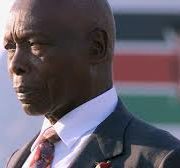The editorial to ‘Kenya: the politics of repression’, a special issue of Race & Class 24/3, Winter 1983.
Wherever imperialism sets foot there’s devastation, immiseration, deracination – and revolt. Kenya is not an exception. Kenya is a case in point.
The coup that shook Nairobi on the morning of August 1st may have been a coup that failed, but it was also a revolution begun. So too was the uprising that prompted Sandino’s return to Nicaragua in 1925 a ‘failure’ – and the 1959 dockers’ strike in Pijiguiti which propelled Guinea-Bissau into armed struggle. And, like them, the coup in Kenya was germinated in the culture of the people. For, as Cabral has said and the Mau Mau struggle has shown, it is the cultural resistance of a people that at a given moment in time takes on the form of political or economic or armed struggle ‘to fully contest foreign domination’. And so it was precisely the cultural jugular of the people that Moi’s govern ment went for -closing down the people’s theatre and imprisoning its songsters and playwrights, shackling the universities of learning and beating their students and teachers into submission, muzzling the media till it learnt to speak with one voice – the voice of Moi.
They were the acts of a desperate regime that could no longer hold, within the pretended bounds of democracy, the contradiction between the masters it served and the people it governed. In the event, the people had to go – and with them, democracy. The coup was only a catalyst, moving Moi towards open tyranny even as he succumbed to international capital (as witness the October economic measures). The path from democracy to dictatorship is paved with imperial gold.
So do all collaborationist regimes of the Third World still the voices of their people and drive their resistance underground. It then falls to us above-ground to give voice to their struggle and show solidarity in their cause. And it is in some small recognition of that task that Race& Class dedicates this issue to the Kenyan resistance. That the writers of these articles should remain anonymous is in the nature of authoritarian regimes; but that one of them should put his name to it shows not only that he is not a Kenyan but that Kenyans are not alone.

